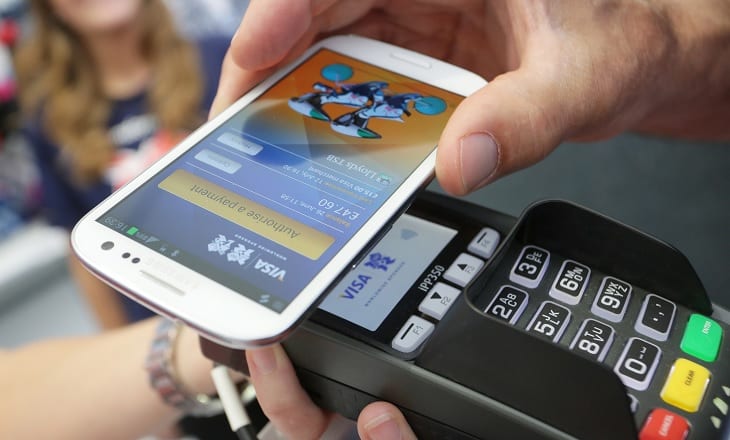The following guest post is courtesy of Luis Aureliano, a business writer and financial analyst. With over 15 years of experience in global finance and an MBA in economics and management, Luis’s areas of expertise include business, marketing, communications, personal finance, macro economics, stocks and emerging markets.
As an entrepreneur you have 101 things to check-off your to-do-list before you can officially launch.
At the top of your list should be finding a payments platform that is affordable, secure, reliable, and accepts a wide-range of global payment methods. Your list should also accept mobile payments. After all, mobile payments are positioned to become the next big thing.
To make this process easier, and to keep you from feeling overwhelmed, here’s a look at some of the leading mobile payment systems for startups.
Due
Founded in 2015, Due is a payment platform that processes credit cards from anywhere in the world for a low flat-rate transaction fee of 2.8 percent. Due also features a digital wallet so that you can get paid instantly and split costs with business partners, can handle ACH payments, and integrates with PayPal and Stripe for additional payment options. Besides being a payment solution for startup owners, Due also offers time tracking and online invoicing.
Square
Square is one of the more innovative payment systems available. With it’s white card swiper that plugs into your mobile device you can accept payments wherever you go. But, we can also accept cash, checks, and gift cards.
Square was designed specifically to replace those traditional POS systems and bulky cash registers. There’s also the Square Online Store so that you can easily set-up an online shop.
Square’s pricing simple; merchants pay just 2.75 percent per swiped transaction and 3.5 percent + $.15 per manual transaction. There are no monthly fees and you can even secure a loan for growing startup with Square Capital.
Flint
Tailor-made for small businesses, Flint scans credit card numbers by using the camera on your smartphone. Don’t worry about security. Completely PCI compliant, Flint encrypts this information plus no card data or images are stored on your device.
You can also use Flint to generate invoices, send payment reminders, manage your customers, and insert a “Buy Now” onto you site directly from your phone.
Flint offers flat fee pricing at 2.95 percent for debit transactions and 2.95 percent for credit card transactions. There are no other charges or early termination fees.
WePay
WePay is another payment system that can be tailored just for your business is that you can get paid faster. Your startup can use WePay for electronic billing and accept payment methods like checks, credit cards, and eChecks.
WePay also accepts online bill payments, electronic transfers, and there’s even WePay debit cards. There’s also a mobile card reader for on-the-go-commerce. Most importantly, it scales and provides a seamless user experience with integrated fraud technology.
Credit card processing fees are 2.9 percent plus $0.30 per transaction while ACH payment processing is 1 percent plus $0.30 per transaction.
Braintree
Founded in 2007, Braintree is now a part of PayPal, and has become a one-stop-shop businesses looking to process payments worldwide. Braintree will also provide a merchant account, payment gateway, recurring billing, and other payment services that online businesses may require
Braintree can also handle payments via Venmo, Apple Pay, Android Pay, Bitcoin, and debit and credit cards. Following your first $50,000 in transactions, you will be charged as little as 2.9 percent + $.30 per transaction.
Stripe
Launched in 2010, Stripe was designed specifically with developers in-mind so that they can create a customized payment solution. Even in it’s basic form, Stripe allows business owners to process credit cards, integrate mobile payments, add coupons, and set-up recurring billing. You can even accept Bitcoins, digital payments, and it works with more than 100 different currencies.
Stripe has one standard fee for all users; 2.9 percent + 30 cents per charge.
Adyen
Adyen is a payments technology company headquartered in Amsterdam and San Francisco. It provides an easy-to-use single global platform if your startup needs to accept payments worldwide. It processes payments online, mobile, and POS in more than 250 payment methods. It also supports payment methods like PayPal, Apple Pay, Android Pay, WeChat Pay, and Alipay.
Adyen has a tiered pricing system so the amount that you’re charged will vary on your monthly transactions. For instance, for under 1,000 transactions the fee is $0.15.
Dwolla
Dwolla is another developer-friendly payments system that allows you to customize how you’re going to make and receive recurring, bulk, or single payments through it’s easy to integrate API.
You can create an account for free and there are no transaction fees. Unfortunately, it only links to a U.S. bank account or credit union account. However, Dwolla has a guide on how startups can process payments like ACH transfers.
GoCardless
GoCardless was designed with smaller merchants in-mind. It’s platform allows you to establish inter-bank transfers directly into your site and it accepts payments from 32 countries. One of the best advantages that GoCardless has is that its fees are lower than that of PayPal and it enables global companies to offer a variety of payment methods so that they can boost their revenues.
Authorize.net
Authorize.net is a payments gateway that has been in existence since 1996. It offers domestic and international transactions for small to medium-sized businesses. With Authorize.net your business can process credit and debit cards, eChecks, and digital payment options like Apple Pay, PayPal, and Visa Checkout. This platform also comes equipped with features like recurring billing, security and fraud prevention tools, and the power to integrate with Quickbooks.
There are no annual or hidden fees,but there is a $49 set-up fee, $25 per month gateway fee, and a 2.9 percent plus $0.30 per transaction fee.
